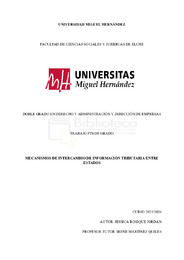Please use this identifier to cite or link to this item:
https://hdl.handle.net/11000/33387Mecanismos de intercambio de información tributaria entre estados
| Title: Mecanismos de intercambio de información tributaria entre estados |
| Authors: Rosique Jordán, Jéssica |
| Tutor: Martínez Quiles, Irene |
| Editor: Universidad Miguel Hernández de Elche |
| Department: Departamentos de la UMH::Ciencia Jurídica |
| Issue Date: 2024-06 |
| URI: https://hdl.handle.net/11000/33387 |
| Abstract: La globalización económica es uno de los principales motivos que ha generado un importante cambio en el terreno fiscal internacional, ya que ha provocado que se generen relaciones de interdependencia mutua entre los diferentes países y sus respectivos sistemas fiscales. Ello ha puesto de manifiesto la fuerte necesidad que tienen los estados de mantener relaciones de cooperación en el intercambio de información tributaria, persiguiendo como principal objetivo acabar con todas aquellas prácticas consideradas como fraudulentas y promover un ambiente de seguridad y transparencia en el ámbito fiscal. Ante un panorama tan dinámico y en constante evolución como es el actual, surge la gran necesidad de hacer un análisis sobre los métodos que utilizan los estados para intercambiar información tributaria entre ellos. Es por ello que la elaboración de este Trabajo de Fin de Grado pretende ofrecer a los lectores un estudio de los diferentes mecanismos que permiten conseguir que se produzca este proceso de intercambio, además de analizar cómo es el funcionamiento de los mismos en la práctica. Además, también analizaremos las funciones ejercidas por importantes organismos internacionales, tales como la OCDE, organización que desempeña una gran labor en el intercambio de información tributaria. Asimismo, otro de los objetivos perseguidos por el presente trabajo será el análisis del impacto generado por la normativa estadounidense FATCA en el ámbito fiscal internacional, ya que consideramos que es una regulación que ha generado una gran repercusión a escala internacional, tanto por su relevancia como por las críticas que ha recibido; considerándose por tanto una pieza clave en las relaciones de cooperación de intercambio de información. En resumen, este trabajo pretende sumergir al lector en el estudio profundo de los diferentes mecanismos que son empleados en la práctica por los estados para hacer efectivo el intercambio de información tributaria y fiscal, así como analizar las características que los definen, los desafíos a los que se enfrentan y sus posibles perspectivas de futuro. Economic globalisation is one of the main reasons that has generated an important change in the international tax field, as it has led to mutual interdependence between the different countries and their respective tax systems. This has demonstrated the strong need for states to maintain cooperative relations in the exchange of tax information, pursuing the main objective of putting an end to all those practices considered fraudulent and promoting an environment of security and transparency in the tax sphere. Faced with such a dynamic and constantly evolving panorama as the current one, there is a great need to analyse the methods used by states to exchange tax information among themselves. For this reason, this Final Degree Project aims to offer readers a study of the different mechanisms used in practice in the exchange of information, as well as analysing how they work in the international sphere. In addition, we will also analyse the functions that are exercised by important international bodies, such as the OECD, the organisation responsible for drawing up both the guidelines and the international standards that aim to promote global cooperation between all states in terms of the exchange of tax information. Likewise, another of the objectives pursued in this paper will be the impact generated by the US FATCA regulation in the international tax sphere, as we consider that it is a regulation that has marked a before and after in this field, both because of the relevance it has had and because of the criticisms that have been made of it; consequently, it is considered a key element in the relations of cooperation in the exchange of information. In summary, this work aims to immerse the reader in an in-depth study of the different mechanisms that are used in practice by states to make the exchange of tax and fiscal information effective, as well as to analyse the characteristics that define them, the challenges they face and their possible future prospects. |
| Keywords/Subjects: Contribuyente elusión fiscal entidad evasión fiscal fraude |
| Knowledge area: CDU: Ciencias sociales |
| Type of document: info:eu-repo/semantics/bachelorThesis |
| Access rights: info:eu-repo/semantics/openAccess Attribution-NonCommercial-NoDerivatives 4.0 Internacional |
| Appears in Collections: TFG - Doble Grado en Derecho y Administración y Dirección de Empresas (DADE) |
.png)

